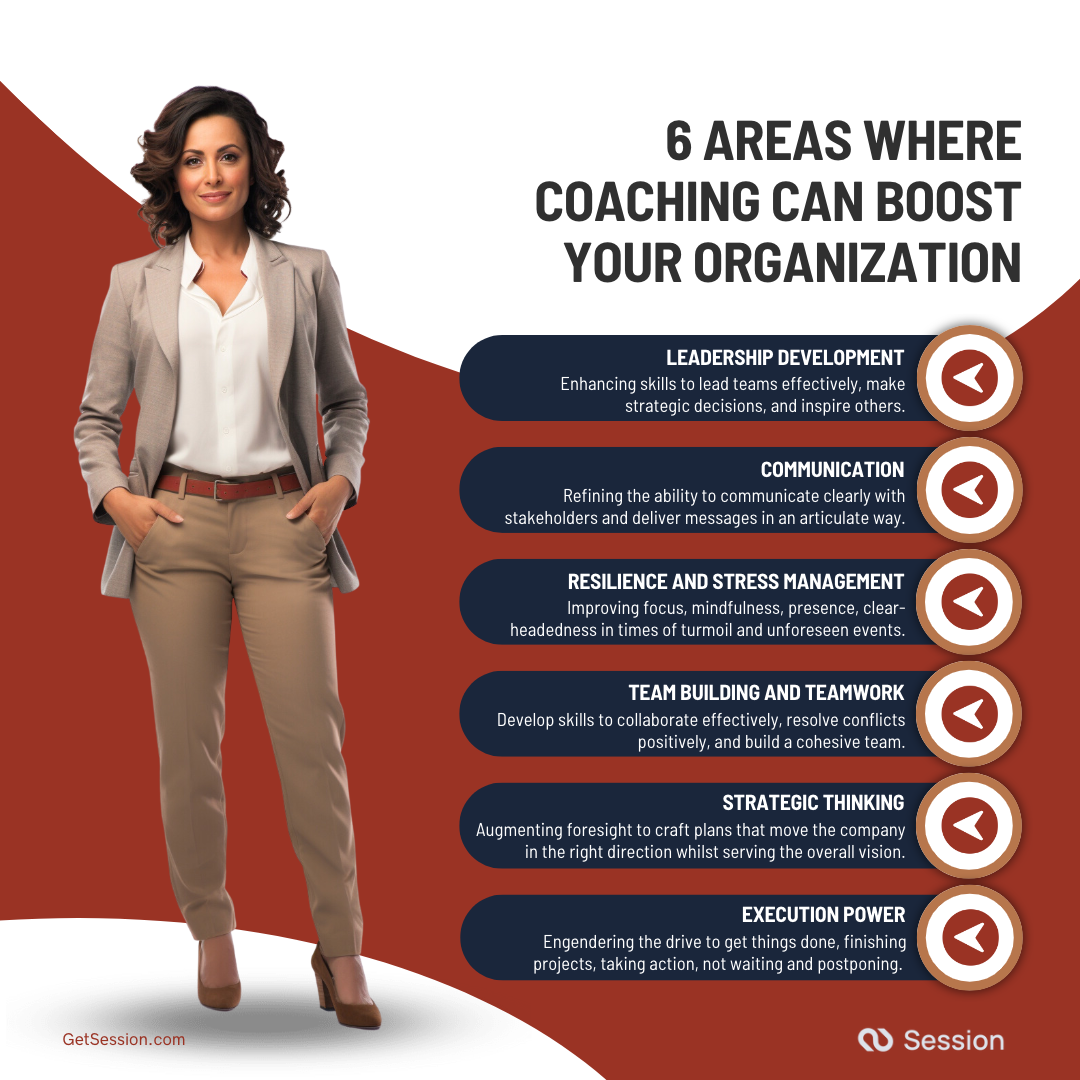Professional business coaches are sought out to assist employees and leaders in navigating the challenges of modern business. They are hired to help upskill the talents within a company and, empower leadership to get the most out of their biggest asset. Most of all, they are brought in to bring companies from where they are to where they would like to be.
But, even though the reasons for offering business coaching seem important and obvious, companies still hesitate to pay what it costs. They question the return on investment and whether it's worth the money. Finances are not a never-ending resource. Businesses need to justify what they are paying for to feel confident about the investment.
So, let’s take a look at what companies gain when they hire professional business coaches? And, how do they know if it paid off?

Benefits of Business Coaching
Professional coaching helps clients respond to the changing dynamics in today’s workplace.
Digital transformations, recessions, and new customer expectations are disrupting almost every industry. To be prepared to adapt and defend their market share, companies need to consistently evolve the skills of their teams.
In addition to external drivers of change, workforces are demanding more. A greater percentage of applicants now look for career growth prospects and further education packages before accepting new jobs.
Whether directly or indirectly demanded, coaching is becoming essential as the benefits of investing in professional business coaching are a more agile, skilled, engaged, self-reflective, proactive, solutions-oriented and (yes) wise workforce.
These are the overall benefits described by frugal but brave companies who have previously enlisted the help of professional coaching.
Modern organizations engage coaches to upskill and develop their workforce within the following areas (amongst others):
- Leadership Development: Enhancing skills to lead teams effectively, make strategic decisions, and inspire others.
- Communication: Refining the ability to communicate clearly with stakeholders and deliver messages in an articulate way.
- Emotional Intelligence: Exercising the ability to put oneself in other’s shoes, empathize, choose the right moment to approach topics, regulate emotions and motivate others.
- Change Management: Strengthening the ability to drive projects forward and lead teams towards a common goal.
- Conflict Resolution: Building skills to handle and resolve conflict in a positive manner.
- Sales and Negotiation - Convincingly communicate the value of a product or service, negotiate deals and hit sales targets.
- Time Management: Using time effectively in an organized and strategic manner for the benefit of the company.
- Problem-Solving: Enhancing the ability to identify, analyze, and solve problems effectively and efficiently.
- Performance Management: Learning to set clear goals, monitor team progress, and provide feedback effectively to improve performance.
- Resilience and Stress Management: Improving focus, mindfulness, presence, clear-headedness in times of turmoil, sudden change and unforeseen events.
- Team Building and Teamwork: Building skills to handle and resolve conflict in a positive manner and collaborating successfully with colleagues in pursuit of challenging goals.
- Self-confidence: Enhancing self-belief to carry oneself with poise and impart the fortitude to endure when needed.
- Strategic Thinking: Augmenting foresight to craft plans that move the company in the right direction whilst serving the overall vision.
- Decision Making: Instilling the confidence to make educated and informed decisions based on inputs from the relevant stakeholders.
- Relationship Building: equipping the skills to cultivate a network and form relationships with key stakeholders.
- Execution Power: Engendering the drive to get things done, finishing projects, taking action, not waiting and postponing.
- Innovation and Creativity: emboldening the creativity to come up with new ideas, and bring them to life.
The Request for Professional Business Coaching Mirrors Business Needs
Motivations for hiring coaches changes frequently over time as is highlighted by the 2009 Harvard Business Review. What mattered years ago likely does not hold the same importance now because of the changing nature of the business landscape.
“Ten years ago, most companies engaged a coach to help fix toxic behavior at the top. Today, most coaching is about developing the capabilities of high-potential performers.” HBR, 2009
While this quote is 10 years old, what resonates is that the purpose remains the same - professional business coaches help organizations solve their most pressing issues.
With that in mind and knowing that the biggest challenge facing today’s companies is how to adapt quickly to ever-changing conditions, a different coaching experience is needed.
In our experience at Session, organizations are crying out for leaders who can build companies that:
- Are agile, resilient and adaptable, and,
- Have a culture of trust, diversity, learning and inclusion.
In the next section we will take a look at when to hire a coach, and then we will dig into the ROI of business coaching.
When to Hire a Coach
When you promote your managers
Quite often, managers are promoted into incompetence meaning what worked in their previous role does not translate to a management role (the Peter Principle).
New managers need to be given the chance to succeed. Make sure your managers get feedback, training, and help to develop within the areas where they need to grow. Leadership and new skills for a new role can be learned - but it requires deliberate training and development of those promoted.
When employees or leaders are struggling in their current role
In a 5-year study, Google found that the most impactful factor on team performance was psychological safety – the social safety to admit mistakes and problems and contribute ideas within their environment.
All companies can benefit from offering leaders the platform to discuss dilemmas, problems and challenges. Having a space to flesh out different ideas on how to enhance themselves and their teams in their working climate is essential to development. Business coaches provide the platform and the psychological safety for such development to occur.
Having a sounding board that employees can confide in and who they do not need to “prove themselves to”, pays off.
Through coaching, the employee or leader can make more educated decisions, get upskilled within areas of admitted weakness, and generate ideas on how to engage and involve others in the projects they are running.
When a new skillset/mindset and/or a new way of collaborating is required
If we could continue doing what we have always done, there would be no need for coaching. But, that’s not the world we live in. Our world sees things change rapidly beyond our control.
Coaching helps employees and leaders navigate the reality of a fast-moving, ambiguous and complex working environment. Furthermore, coaches give clients ideas, tools, and concrete advice on how to act and lead in times of constant change.
Employees and leaders need to be trained and challenged to think outside the box and to engage others (stakeholders inside and outside the organization, customers, politicians, competitors) in novel ways. They need fresh perspectives!
How do we measure the Return on Investment of coaching?
With the benefits of professional coaching clarified as well as when to hire a coach the question becomes: how do we measure and prove the ROI?
An article published in the Journal of Positive Psychology, 2014, showed that professional coaching works with regard to performance, well-being, attitude, and goal direction. Is this enough to trust for measurement? And, is it enough that all the aforementioned benefits are reported by employees, leaders, or coaches? In our opinion, no. Companies deserve better and more tangible proof.
Each company should monitor the effectiveness of the coaching engagement so that they can build the business case for their investment.
To help quantify your ROI, we encourage you to set up specific metrics at the beginning of the coaching program which you can use to prove the ROI. This could be:
- eNps scores - for the team, and company.
- Individual performance scores - rated by not only the employee but also employers, customers, managers, collaborators, board members, and other stakeholders.
- Sales targets for before and after a coaching experience.
- Engagement scores marked through efficient employee surveys.
- Customer satisfaction scores.
Measuring success are of mutual benefits to managers, leaders, and employees, but most importantly it makes it easy to convince managers of the importance of investing in business coaching, also in the future.
Lost Opportunity Cost
In measuring ROI of business coaching, it is equally important to consider what the future would look like WITHOUT opting for business coaching. What are the lost opportunity costs of NOT hiring a professional coach? What lost value could a coach have added? What are the possible costs of a higher attrition rate, lower engagement, lower performance in general, lack of visibility and alignment around vision and strategic goals? A higher dissatisfaction with the leader or even with the company performance as perceived by the board and other stakeholders?
It is good to keep this in mind when thinking about the return on investment.
Furthermore, it is worth reminding ourselves that the world we live in today can rarely be predicted and calculated in a linear way. When things are predictable, we can count on a straight answer. But when the reality is messy, as is the case with modern work life, we need to broaden our perspectives and experiment with different kinds of interventions and then judge the outcome.
Trying new approaches in times of turmoil can be anxiety-provoking for the secure seeking mind. However, it's the only way forward if we wish to harness the fruits and "delight in the possible".
In Conclusion
Research shows that coaching helps organizations and their leaders and employees improve performance, collaboration skills, and ultimately, the bottom line. Coaching allows forward-thinking companies to stay agile, adaptable, and ready for the next new.
Going forward, for you to ensure you can maximize learning and measure growth, look to coaches who will work with you toward specific and tangible metrics. Choose coaches who are happy to have your business-critical matters being the proof of success.
If you want to bring your business to the next level, reach out to engage a professional business coach today.












